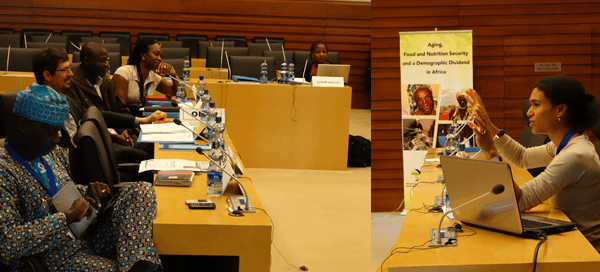Africa, as many of you will know, is the youngest of all world regions, blessed with a huge population of children and youth. But now I would like you to picture an older person in Africa – is she the happy, loved and well cared for elder in a rural village so many of us have ingrained in our minds?
Or is she poor, vulnerable and left alone without care as her children go to the city in search of work? Or is she an active economic force in her local community, where at age 65 she is still running her own farm and small produce business? And what is the relevance of her situation to mainstream thinking on strategies to deliver on Africa’s promise of sustained growth and progress?

Dr. Isabella addressing participants during a conference on Aging, Food and Nutrition Security and a Demographic Dividend in Africa.
Despite a growing awareness of aging as a humanitarian and rights issue, the continent’s older population continues to receive at best minimal attention in current debates on social and economic development across the continent. And although there is progress being made, including good work being done by the World Health Organization’s initiative on championing a life course approach to healthy and active aging, a highly anticipated new initiative on Aging by Partners in Population and Development (PPD) and HelpAge International’s Global Age Watch Index, the progress is small and limited when compared to other development agenda items like non-communicable disease or maternal health. Furthermore, unlike many other UN recognized days, you will see little attention paid in the media, by advocacy groups or in online discussions around the International Day of Older Persons.
To an extent this lack of attention can be understood, at least in part, as a arising from the fact that older adults only represent a small proportion (5%) of the population in Africa, as well as from common assumptions about old age as a period of dependence and unproductivity.
Indeed, the notion of a ‘dependency ratio’ of ‘productive’ adults’ (15-59/64 years) to ‘unproductive’ older adults and children, underpins African leaders’ present thinking on the search for what in population and economic terms comes close to finding the holy grail – achieving what is known as a Demographic Dividend (DD) in coming years. Such a dividend would mean capitalizing on Africa’s large youth bulge to catalyze economic growth and reduce poverty by taking full advantage of a window of time where the ‘working age’ population significantly outnumbers the share of children and older adults. Some of our Asian neighbors accomplished such a feat about a decade ago.
However, new thinking in Africa strongly questions the presumed economic and strategic irrelevance of older people broadly, and, specifically for the realization of a DD in the continent. Indeed, it asserts that if harnessed appropriately, Africa’s older population may be a unique strength, not only for achieving a DD, but for building future societies that are just, and grounded in African values of family and intergenerational cohesion.
As yet there are large gaps in our understanding of the particular relevance of older Africans’ roles and impacts in families and societies for the prospects of achieving a DD. This nexus must be examined carefully and implications for action – by African governments, the private sector or civil society – must be identified.
In order to address this knowledge and policy gap the African Population and Health Research Center (APHRC), in partnership with the African Union Commission (AUC) and the United National Economic Commission for Africa (UNECA) is today officially launching a new Working Group titled, ‘Aging and Achieving a First Demographic Dividend in Africa’. The Group comprises of 17 key experts from academia, civil society and policy across a spectrum of substantive fields.
Building on a preliminary concept that set out initial perspectives and queries on key areas in which older people’s functions impact on the drivers of a DD in Africa, the Working Group commenced its deliberations in a first meeting on 6-7 June 2013 at the African Union Headquarters in Addis Ababa, Ethiopia. The rich discussions underscored not only the timeliness, but also potential strength of a ‘case’ for capitalizing on the spectrum of functions that older Africans play in both family and societal spheres for achieving a first DD. In this regard, the Group also delineated broad, tentative areas for possible interventions to maximise the gains and minimize losses to key drivers of a DD that arise from older people’s impacts.
Moving forward, and based on a rapid generation and compilation of incisive evidence and analyses in the coming months, the Group will further examine the potential intervention areas. Where appropriate, it will develop these into concrete recommendations on policy or programmatic responses to fully harness the potential of Africa’s older population for the achievement of a DD.
A second meeting of the Working Group is scheduled for the Spring of 2014 and its final report will be released later next year.